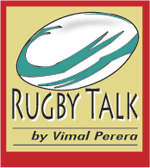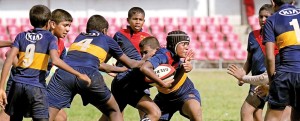Where do they draw the line?
View(s):Watching the Schools Under-14 Rugby Championship on Monday and Tuesday, I was appalled at the attitude of some coaches during tournament where a slap across the face after losing a match was thought to be in order. The language used by some at the young student was even worse.
 Coach Gavithra de Zoysa and Master-in-Charge of Trinity set a worthy example when on the first day when they were to play the last match. The light was bad and fading. They agreed to play the match on Day 2 at 7.30 in the morning. This cut the resting time, as the quarters were to start by 8.00am. The value of the example was most important. Despite that, the juniors went out to win the Cup quarters. Trinity Juniors who displayed good skills lost to the bigger set of Royal in the semi-final. I would say in the spirit of rugby and junior rugby you were winners on the day and be proud of yourself.
Coach Gavithra de Zoysa and Master-in-Charge of Trinity set a worthy example when on the first day when they were to play the last match. The light was bad and fading. They agreed to play the match on Day 2 at 7.30 in the morning. This cut the resting time, as the quarters were to start by 8.00am. The value of the example was most important. Despite that, the juniors went out to win the Cup quarters. Trinity Juniors who displayed good skills lost to the bigger set of Royal in the semi-final. I would say in the spirit of rugby and junior rugby you were winners on the day and be proud of yourself.
I cannot say the same thing of the team management of St. Peter’s. On Day 1, the matches started late as there were delays with the arrival of some outstation teams. Kingswood travelling from Kandy had arrived a little later. The organisers requested St. Peter’s to give Kingswood a little time to settle and for St. Peter’s to play their match before the Kingswood match. It was a no and the game was delayed and ate into time forcing to stop the last game due to bad light. What a way to put the game before self in the minds of juniors.

The true spirit of the game was displayed by the Trinity U-14 side - Pic by Amila Gamage
I noted that a majority of coaches showed discipline on the Technical Zone and fewer comments aimed at the match officials in the presence of players except the odd incident where coaches want to show that they are there. More to parents and a few old boys who possibly decide on their bread and butter. I felt that the matches played on Monday and Tuesday too had an effect, as there were less of the old boy followers, whom I am now convinced, start issues as and when they started trickling after office.
The development stage of rugby or age rugby is much important to improve the quality and quantity of rugby players. The need for a good philosophy in coaching juniors is necessary. Couple this with a good playing philosophy “taking account of the Principles of Play”, Gain possession, Go forward, Support, Continuity, Pressure. The aim of age rugby should be to develop and deploy the right skills, knowledge, attributes, and values at every age and stage of a player’s development. Getting the right coaches with the right ethos and training at the right time is important to ensure meeting the needs of players.
The value of having a personal coaching philosophy is to maintain clarity, direction and focus in the way you work in handling the young as coaching is not just about passing on your knowledge. It should be about values and behaviours, regardless of the pressures and influences.
This requires an understanding of the objectives when deciding the philosophy at junior level. At ages below 10, the objective in my view, is to introduce the fundamentals of movement and introduces Agility, Balance and Coordination (ABC). Thus at each level you introduce situations to improve game and a feeling of the rules that govern the game. Modify these from time to time to create an understanding. By the time, you are 14, there should be a development to introduce junior rugby with some competition coming in and then the adult player should be knowledgeable when he reaches the competitive stage.
It is here that the schools section and the Governing Body must get together and develop a guideline on developing coaching styles and the philosophy as well as have qualified educators doing continuous professional development. The need for involvement of sports or education psychologists as educators seems to be need number 1.
Royal beat Isipathana to take the Under-14 title. Royal displayed a good skill set during the run up to the games. It appeared that they had a structure to feed the top end of the school rugby. Executing the driving maul and good rucking showed a good honing of skills.
Pathana too played with skill and performed very well in their match against Wesley probably a good match that came early. Wesley were somewhat unlucky in the draw that pitied a good team against a good team. In the final, however the Park School changed the wide passing game they played against Wesley and opted to come in to the forwards and played into the hands of Royal, who were much better in this area. They kept possession and moved forward and there was support and continuity. Wesley too had developed skills and played as a team.
Trinity is another team that showed skill and playing to the spirit of rugby while losing to the bigger Royal side. It was trite disappointing to see most schools concentrating on or two players while the others were running along. Some schools used big made players to barge through and at most times given the ball. They were clueless about the rugby skills and playing at the breakdown. With the pot increasing, we will see more and more of this as we progress.
Vimal Perera is a former Rugby Referee, coach and Accredited Referees Evaluator IRB


